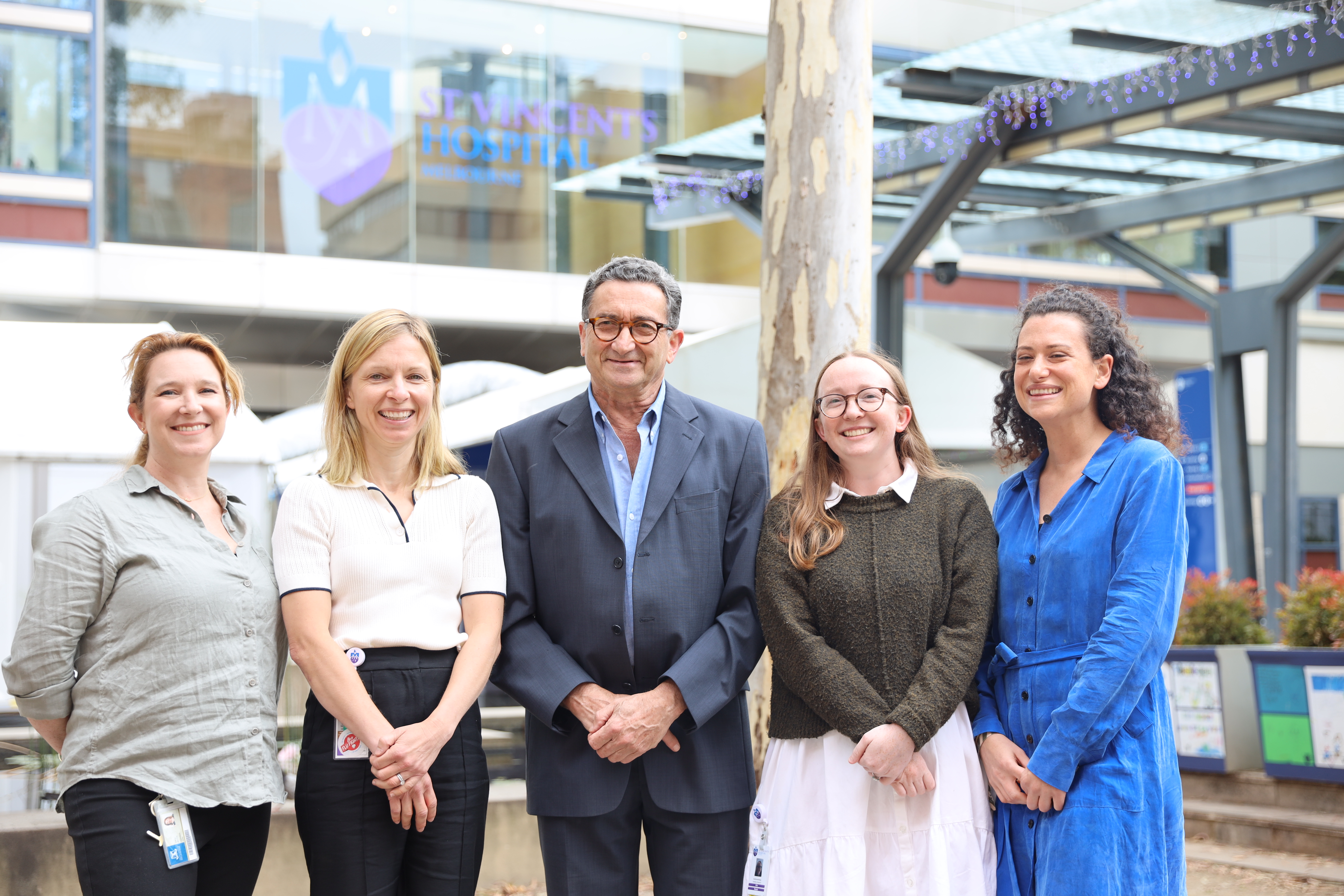Tailored dietary therapy improves diet satisfaction for IBD patients

Pictured above: The DELECTABLE project team (L to R) Dr Amy Hamilton, Dr Ola Niewiadomski, Professor Michael Kamm, Erin Russell, Dr Gina Trakman
A novel dietary program developed as part of a collaborative research study involving St Vincent’s Hospital Melbourne (SVHM) has been shown to enhance diet satisfaction in patients with inflammatory bowel disease (IBD).
The DELECTABLE program offers patients greater access to more varied dietary therapies that can be personalised to specific symptoms and lifestyle needs alongside clinical care.
As part of the study, SVHM’s Nutrition and Dietetics Department worked closely with University of Melbourne researchers on the creating a range of diets that also hope to decrease disease activity and symptoms for patients.
Previously, the only validated diet therapies available for IBD patients were a partially or completely liquid diet utilising supplement drinks. Erin Russell, Research Dietitian Project Lead at St Vincent’s and the University of Melbourne, highlighted that although the liquid diet approach has had a positive impact on patient health, it is not always well tolerated and compliance can be poor.
“Currently there are only two diet therapies that have proven effect for disease control in patients with IBD. Both are liquid based, strict, and designed for 8-12-week treatment. They give no long-term guidance,” said Erin.
Foods that cause inflammation, including chemical-containing ultra-processed foods, have recently been shown to contribute to active disease in IBD. As a result, three dietary therapies were developed as part of the DELECTABLE program study to support patients in reducing the amount of ultra-processed foods they consume and to encourage cooking from fresh ingredients.
“Patients with IBD can play a role in diminishing their disease activity by adopting dietary measures that are enjoyable and sustainable. A smart and informed dietary approach is essential for better health outcomes,” said Erin.
The study’s success has seen the DELECTABLE program resources now adopted as part of routine clinical care at St Vincent’s IBD clinic.
Empowering patients through personalised support
.JPG)
Pictured above: Erin Russell and Professor Michael Kamm
The diet therapies created as part of this study concentrates on diet variety and include all food groups. Along with a focus on good quality of life, the program provides access to up-to-date dietary research and information.
“We hope the program will empower patients to have more control over how food interacts with their disease and how they can best control any future flare-ups and inflammation,” said Erin.
During the study, the trial participants received regular dietetic review and education resources including recipes, food lists and snack ideas. Diet satisfaction and compliance were key study targets.
“The program gives patients more options through personalisation – it looks at what is important to them and what diet therapy will support their symptoms. Diet allocation is determined with shared decision-making between the patient and their dietitian,” said Erin.
The DELECTABLE Program results have been presented at national and international conferences, including the Australian Gastroenterology Week, the European Crohn’s and Colitis Conference and the Digestive Diseases Week in the US.
“Food concerns all of us but is of even greater importance to patients with inflammatory bowel disease. It plays a role in not only generating symptoms but also in driving the disease. The personalised DELECTABLE approach has achieved high patient satisfaction while improving the course of their disease,” said Professor Michael Kamm, senior DELECTABLE team researcher and a gastroenterologist at St Vincent’s Hospital Melbourne.
Plans are now underway for a DELECTABLE 2.0 program research study to be developed, which will focus on personalisation and predicting which patients respond best to different diet therapies.